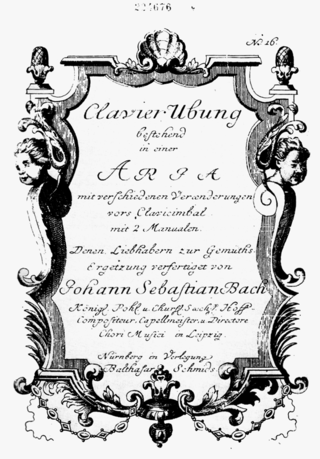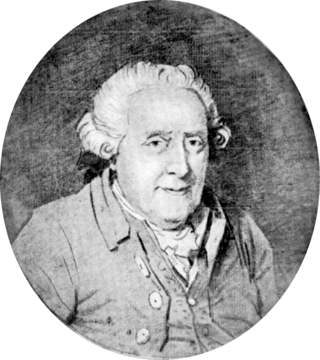
The Goldberg Variations, BWV 988, is a musical composition for keyboard by Johann Sebastian Bach, consisting of an aria and a set of 30 variations. First published in 1741, it is named after Johann Gottlieb Goldberg, who may also have been the first performer of the work.

Free music or libre music is music that, like free software, can freely be copied, distributed and modified for any purpose. Thus free music is either in the public domain or licensed under a free license by the artist or copyright holder themselves, often as a method of promotion. It does not mean that there should be no fee involved. The word free refers to freedom, not to price.

The Mutopia Project is a volunteer-run effort to create a library of free content sheet music, in a way similar to Project Gutenberg's library of public domain books. It started in 2000.

A Creative Commons (CC) license is one of several public copyright licenses that enable the free distribution of an otherwise copyrighted "work". A CC license is used when an author wants to give other people the right to share, use, and build upon a work that the author has created. CC provides an author flexibility and protects the people who use or redistribute an author's work from concerns of copyright infringement as long as they abide by the conditions that are specified in the license by which the author distributes the work.

Wilhelm Friedemann Bach was a German composer, organist and harpsichordist. He was the second child and eldest son of Johann Sebastian Bach and Maria Barbara Bach. Despite his acknowledged genius as an improviser and composer, his income and employment were unstable, and he died in poverty.

The Art of Fugue, or The Art of the Fugue, BWV 1080, is an incomplete musical work of unspecified instrumentation by Johann Sebastian Bach. Written in the last decade of his life, The Art of Fugue is the culmination of Bach's experimentation with monothematic instrumental works.
Arthur Emil Helmut Walcha was a German organist, harpsichordist, music teacher and composer who specialized in the works of the Dutch and German baroque masters.

Bösendorfer is an Austrian piano manufacturer and, since 2008, a wholly owned subsidiary of Yamaha Corporation. Bösendorfer is unusual in that it produces 97- and 92-key models in addition to instruments with standard 88-key keyboards.

Gustav Maria Leonhardt was a Dutch keyboardist, conductor, musicologist, teacher and editor. He was a leading figure in the historically informed performance movement to perform music on period instruments.
This is a list of commercial or professional recordings of Johann Sebastian Bach's Goldberg Variations, organized chronologically. The list is sortable by clicking on the small arrows at the top of each column.

Public-domain-equivalent license are licenses that grant public-domain-like rights and/or act as waivers. They are used to make copyrighted works usable by anyone without conditions, while avoiding the complexities of attribution or license compatibility that occur with other licenses.

Johann Sebastian Bach was a German composer and musician of the late Baroque period. He is known for his orchestral music such as the Brandenburg Concertos; instrumental compositions such as the Cello Suites; keyboard works such as the Goldberg Variations and The Well-Tempered Clavier; organ works such as the Schubler Chorales and the Toccata and Fugue in D minor; and vocal music such as the St Matthew Passion and the Mass in B minor. Since the 19th-century Bach revival, he has been generally regarded as one of the greatest composers in the history of Western music.

The International Music Score Library Project (IMSLP), also known as the Petrucci Music Library after publisher Ottaviano Petrucci, is a for-profit subscription-based digital library of public-domain music scores. The project uses MediaWiki software, and as of 24 November 2023 has uploaded more than 736,000 scores and 80,700 recordings by 1,900 performers of more than 226,000 works by 27,400 composers. IMSLP has both an iOS app and an Android app.

Bach: The Goldberg Variations is the debut album of Canadian classical pianist Glenn Gould. An interpretation of Johann Sebastian Bach's Goldberg Variations, the 1956 record launched Gould's career as a renowned international pianist, and became one of the most well-known piano recordings. Sales were "astonishing" for a classical album: it was reported to have sold 40,000 copies by 1960, and had sold more than 100,000 by the time of Gould's death in 1982. In 1981, a year before his death, Gould made a new recording of the Goldberg Variations, sales of which exceeded two million by the year 2000.

MuseScore is a music notation program for Windows, macOS, and Linux supporting a wide variety of file formats and input methods. It is released as free and open-source software under the GNU General Public License. MuseScore is accompanied by a freemium mobile score viewer and playback app, and an online score-sharing platform.

The Well-Tempered Clavier, BWV 846–893, consists of two sets of preludes and fugues in all 24 major and minor keys for keyboard by Johann Sebastian Bach. In the composer's time, clavier referred to a variety of stringed keyboard instruments, most typically the harpsichord or clavichord, but not excluding the organ, although it is not a stringed keyboard.

Kimiko Douglass-Ishizaka is a German-Japanese composer, pianist, and former Olympic weightlifter and powerlifter.
Konstantin Yakovlevich Lifschitz is a Russian pianist of Jewish descent.
Prelude and Fugue in E minor, BWV 855, is the 10th prelude and fugue for keyboard (harpsichord) in the first book of The Well Tempered Clavier, composed in 1722 by Johann Sebastian Bach. The Prelude in E minor, BWV 855a, features as No. 18 ("Praeludium 5") in the 1720 Klavierbüchlein für Wilhelm Friedemann Bach. BWV 855a may also refer to both this Prelude and a Fughetta in the same key, an early version of BWV 855. Alexander Siloti made a piano arrangement in B minor of the Prelude BWV 855a.
















